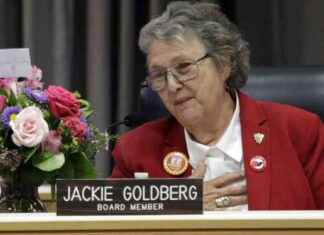Like many activists from Hirak, the popular movement which agitated Algeria between 2019 and 2021, Hamid marched for Palestine on Thursday October 19, “even if the demonstration is supervised by a regime which prohibits gatherings and continues to repress those who demand peaceful change.” “It’s a duty,” he said, while saying he understood those who announced, on social networks, their refusal to participate in a “demonstration organized by those in power.”
The Algerian authorities, who ban all processions out of fear of a return of the Hirak, unceremoniously repressed attempts at support marches in Gaza on October 13. In reaction, the former head of the Movement of Society for Peace (MSP, close to the Muslim Brotherhood), Abderrezak Makri, denounced, in a video published on social networks, the ban on Algerians expressing their solidarity . He then invited the government to organize these gatherings itself, the question of Palestine being one of the rare subjects of consensus between the government and the various oppositions.
Algeria has indeed offered the paradox, since the start of the war in Gaza, of being a country without the right to demonstrate while popular and official support for the “resistance by all means” of the Palestinians is unwavering. The frustration was expressed openly on social networks where some noted with annoyance that in Morocco, a country which has normalized its relations with Israel, the population was able to express its anger. The position of Algiers therefore became more and more untenable, especially as the emotion of its population grew. The risk was becoming great that “uncontrolled” demonstrations would resume, particularly when leaving mosques after Friday prayers.
” Two weights, two measures “
To avoid this scenario, the authorities therefore encouraged, with the support of the Front of Socialist Forces (FFS) and satellite parties, the population to take to the streets on Thursday. Despite the notable absence of “Islamists in beards and djellaba”, according to the Twala site’s formula to designate the supporters of the former Islamic Salvation Front (FIS) – of which 16 former leaders were placed under arrest warrant on the 13th October after the publication of a press release on the general situation in the country – the Algerians finally responded in their thousands “present for Palestine”.
Like Hamid, many chose to forget that the gathering was supervised by a “power that flouts the right to demonstrate.” The object of their denunciation: “the double standards” of Westerners who condemn Hamas as if “history had begun on October 7”, when more than a thousand Israelis, the vast majority civilians , were killed, and deny Palestinians the “right to resist that is given to Ukrainians.” Their banners read: “No to the killing of children, women and civilians! », “Where are the human rights? », “Biden war criminal”. Some are calling for the dismissal of the American ambassador to Algiers.
Many also denounce the French media which they consider biased. In Algeria, even secularists consider that the Islamists of Hamas are primarily a resistance movement, and do not hesitate to draw a parallel with the fight for independence. “No one forgets that the National Liberation Front (FLN) was also described as ‘terrorist’ by the occupation,” notes Hamid.
The authorities have decided to cancel all cultural events, including the festivities of November 1, the date of the outbreak of the Algerian revolution (1954-1962). There is no consensus on the decision. For some, November 1 was an opportunity to proclaim the legitimacy of the Palestinian right to resistance, including through arms.






